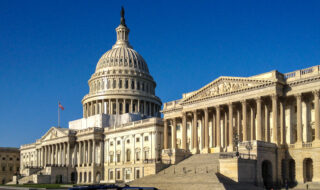January 15, 2021 Last Edit: March 4, 2025
The Legislative Bill Mill Starts Turning
State Director Bob Hallstrom reports from Lincoln on the legislative and political week ending January 15
As of Thursday, January 14, the seventh day of the 2021 Legislative Session, a total of 419 bills and nine proposed constitutional amendments have been introduced. With three days left for bill introductions, the total number of bills this session is expected to rival the number introduced in recent years.
In a typical year, committee hearings would commence next Tuesday and bills advancing from committee to the floor of the Legislature would be scheduled for floor debate soon thereafter. But as a result of the pandemic, committee hearings will commence on Monday, January 25, with hearings to be conducted both in the mornings and afternoons. Floor debate which, would normally take place during the morning sessions of the Legislature, will be limited until the committee hearings have been completed in late February or early March.
Governor’s State-of-the-State Address
Gov. Pete Ricketts presented the annual State of the State address on Thursday January 14, calling for property tax relief, limited spending growth, reduced regulatory red tape, public safety, tax relief for military veterans and their families, and enhanced broadband access.
The governor’s current budget proposal would limit increased state spending to a 1.5 percent growth rate. The governor is also proposing to place a 3 percent growth limit on local government property taxes. The governor’s budget plan also includes the following appropriations:
- $1.36 billion in total property tax relief provided by the state in the coming biennium
- An initial $115 million state investment to build a new $230 million state prison
- $50 million in state funding to help attract the new U.S. Space Command to Offutt Air Force Base
- $20 million in each of the next two years to enhance broadband connectivity.
Committee Designation Musical Chairs
After going to press last week, the preliminary Committee on Committees report was revised as a result of a number of senators switching positions on various committees. Of most significance to NFIB is the departure of Sen. Julie Slama (Peru) from the Business and Labor Committee to serve on the Banking, Commerce and Insurance Committee. Sen. Tim Gragert (Creighton) has been designated to take her place on the Business and Labor Committee. As a result of this switch, members of the Business and Labor Committee, are as follows:
- Sen. Ben Hansen (Blair), Chairman
- Sen. Carol Blood (Bellevue)
- Sen. Tim Gragert (Creighton)
- Sen. Steve Halloran (Hastings)
- Sen. Matt Hansen (Lincoln)
- Sen. Megan Hunt (Omaha)
- Sen. Steve Lathrop (Omaha)
Bills of Small Business Interest
Among the measures of interest to NFIB that have been introduced thus far are the following:
- Legislative Bill 52 – COVID-19 Liability Protections: Sen. Steve Lathrop (Omaha) has introduced LB 52 that would preclude liability of any person in a civil action for injury or death resulting from an alleged exposure to COVID–19 if the exposure occurred after the effective date of the act.
- Legislative Bill 64 – Taxation of Social Security Benefits: Sen. Brett Lindstrom (Omaha) has introduced LB 64, which would provide, for tax years beginning on or after January 1, 2021, for a reduction in federal adjusted gross income by a percentage of the Social Security benefits received and included in federal adjusted gross income, commencing with 20 percent in 2021 and increasing by 20 percent each year thereafter until federal adjusted gross income is reduced by 100% of the benefits for tax years beginning on or after January 1, 2025.
- Legislative Bill 69 – Student Loan Repayment Tax Credit Act: Introduced by Sen. Jen Day (Omaha), LB 69 would allow a tax credit, beginning January 1, 2022, for any employer who plans to repay student loan principal and interest directly to the relevant lender or servicer of the loan on behalf of the qualified employee. The tax credit would be equal to 50 percent of the employer’s student loan repayment, up to a maximum credit of $1,800 for each qualified employee for whom student loan repayments are made in any taxable year for up to 20 qualified employees per taxable year.
- Legislative Bill 72 – Sale of Alcohol for Consumption off Premise: Sen. Suzanne Geist (Lincoln) has introduced legislation that would authorize the sale of alcohol not in the original package, for consumption off premise if the alcohol liquor is:
- not partially consumed
- in a label and sealed container with a tamper-evident lid, cap, or seal.
- Legislative Bill 79 – Property Tax Credit Act: Sen. Tom Brise (Albion) introduced LB 79 that would provide for a minimum amount of relief under the Property Tax Credit Act of $275 million through 2023 and for tax year 2024 and each year thereafter, the minimum amount of relief shall be the minimum amount from the prior tax year increased by the allowable growth percentage provided under law.
- Legislative Bill 122 – Minimum Wage – Tipped Employees: Sen. Megan Hunt (Omaha) has introduced legislation that would increase the minimum wage for tipped employees from $2.13 per hour, plus all gratuities, to $9 per hour.
- Legislative Bill 133 – The Nebraska Consumption Tax Act: Sen. Erdman (Bayard) is the sponsor of LB 133, which would eliminate all property, income, and corporate taxes and replace them with a tax on the use or consumption in the state of Nebraska of taxable property or services (excludes intangible property and services, including financial intermediation services) at a rate of 10.64 percent. Senator Erdman has also introduced a companion proposed constitutional amendment (LR 11CA) to accomplish the same objective.
- Legislative Bill 139 – COVID-19 Liability Protection Act: Sen. Tom Briese (Albion) has introduced LB 139 that would prevent a person from bringing or maintaining a civil action seeking recovery for any injuries or damages sustained from exposure or potential exposure to COVID-19 unless the plaintiff can prove, by clear and convincing evidence, that the civil action relates to a minimum medical condition (a diagnosis of COVID-19 that requires inpatient hospitalization or results in death) resulting from gross negligence or willful misconduct. The bill would also prohibit a civil action seeking recovery for any injuries or damages sustained from exposure or potential exposure to COVID-19 from being brought or maintained if the act or omission alleged violated duty of care was prevented by, in substantial compliance with, or consistent with any federal or state statute, regulation, or order or public health guidance related to COVID-19 that was applicable to the person or activity an issue at the time of the alleged exposure or potential exposure. The bill does not affect the rights or limits under the Nebraska Workers Compensation Act.
- Legislative Bill 170/Legislative Bill 207 – Workers’ Compensation – Waiting Time: Sen. Matt Hansen (Lincoln) and Sen. Mike McDonnell (Omaha) have each introduced separate, identical bills (LB 170 and LB 207), which would reduce the “waiting time” period from seven to three calendar days and the time period to allow compensation to be paid from the date disability began from six weeks to two weeks.
- Legislative Bill 171 – Unemployment Insurance: Sen. Matt Hansen has also introduced LB 171 which would allow for an increase in an individual’s weekly benefit amount of 5 percent for each dependent:
- a child under the age of 19 years
- a child who is a full-time student under the age of 26 years and who is financially dependent upon the individual
- a child of any age who is medically certified is disabled and depended upon the individual) of the individual up to a maximum increase of 15 percent
- Legislative Bill 249 – Fair Employment Practices Act – Wage History: Sen. Patty Pansing Brooks (Lincoln) has introduced LB 249 that would make it an unlawful employment practice for an employer to:
- inquire about or seek from a job applicant or from the applicant’s current or former employer the wage rate history of the applicant, except to confirm any wage rate history voluntarily provided by the applicant as part of compensation negotiations
- require disclosure of a job applicant’s wage rate history or condition employment or consideration for an interview or employment on disclosure of wage rate history
- retaliate against a job applicant for failing to comply with any wage rate history inquiry
- rely on the wage rate history of a job applicant from any current or former employer of the applicant in determining the wages for such applicant at any stage in the employment process, including the negotiation or drafting of any employment contract, unless such applicant knowingly and willingly disclosed his or her wage rate history to the employer.
- Legislative Bill 256 – Workers Compensation – Approval of Lump Sum Settlements: Sen. Matt Hansen is the sponsor of legislation that would clarify that a release of a lump-sum settlement for indemnity benefits only, that is not required to be submitted for approval by the Compensation Court, need not contain allegations regarding eligibility for Medicare if the employee’s right to receive future medical, surgical, and hospital services is specifically excluded from the settlement.
- Legislative Bill 258 – The Healthy and Safe Families and Workplaces Act: Introduced by Sen. Tony Vargas (Omaha), LB 258 would allow employees to accrue a minimum of one hour of paid sick time for every 30 hours worked, with a maximum of 40 hours of paid sick time accrued in a calendar year. Under the measure, employees would be entitled to use accrued paid sick time beginning on the 60th calendar day following commencement of employment. Paid sick leave would be authorized for:
- an employee’s mental or physical illness, injury, or health condition
- an employee’s need for medical diagnosis, care, or treatment of a mental or physical illness, injury, or health condition
- an employee’s need for preventative medical care
- care of a family member with a mental or physical illness, injury, or health condition; care of a family member who needs medical diagnosis, care, or treatment of a mental or physical illness, injury, or health condition
- care of a family member who needs preventative medical care
- absence necessary due to domestic abuse, domestic assault, sexual assault, or stalking.
- Legislative Bill 290 – Paid Family and Medical Leave Insurance Act: Sen. Machaela Cavanaugh (Omaha) has introduced legislation that would establish a statewide paid family medical leave insurance program similar to Nebraska’s unemployment insurance system, managed by the state Department of Labor. It would apply to all employers subject to the Employment Security Act (one or more employees), with self-employed individuals eligible to participate. And it would provide employees with benefits of up to two-thirds of the state average weekly wage for up to 12 weeks of leave or, for leave taken on an intermittent basis, 60 work days during any benefit year.
- Legislative Bill 310 – Inheritance Tax Exemptions: Sen. Robert Clements (Elmwood) has introduced LB 310, which would increase, commencing January 1, 2022, the inheritance tax exemption for immediate family members from $40,000 to $150,000 and would reduce the rate of taxation and beginning on January 1, 2023, from 1 percent to .75 percent and on January 1, 2024, and every year thereafter, to .50 percent The bill would also, commencing on January 1, 2024, increase the exempt amount to $160,000 and increase the exempt amount by $5,000 for each subsequent calendar year. Commencing January 1, 2022, the bill would decrease the inheritance tax exemption for uncles, aunts, nieces or nephews, from 13 percent to 11 percent and increase the exemption amount from $15,000 to $60,000; beginning January 1, 2023, the rate of taxation would be reduced to 9 percent and the exemption amount increased to $62,500, and beginning January 1, 2024, the rate of taxation would be decreased to 6 percent and the exemption amount increased to $65,000 and increased by $2,500 each calendar year thereafter. Finally, commencing January 1, 2022, the bill would decrease the rate of taxation for all other persons from 18 percent to 15 percent and increase the exempt amount from $10,000 to $40,000; beginning on January 1, 2023, would decrease the rate of taxation to 12 percent and increase the exempt amount to $42,500; and beginning on January 1, 2024, and each year thereafter, decrease the rate of taxation to 9 percent with the exempt amount to be increased to $45,000, and increased by $2,500 each year thereafter.
- Legislative Bill 327 – Financial Literacy: Introduced by Senator Slama, LB 327 would require, commencing in school year 2022–23, for at least one half–credit hour of the minimum credit hours required for graduation to be a personal finance or financial literacy course.
Previous Reports and Related News Releases
January 14—Small Business Comments on Governor’s State-of-the-State Address
January 8—Nebraska Legislature Begins New, Two-Year Session

NFIB is a member-driven organization advocating on behalf of small and independent businesses nationwide.
Related Articles














